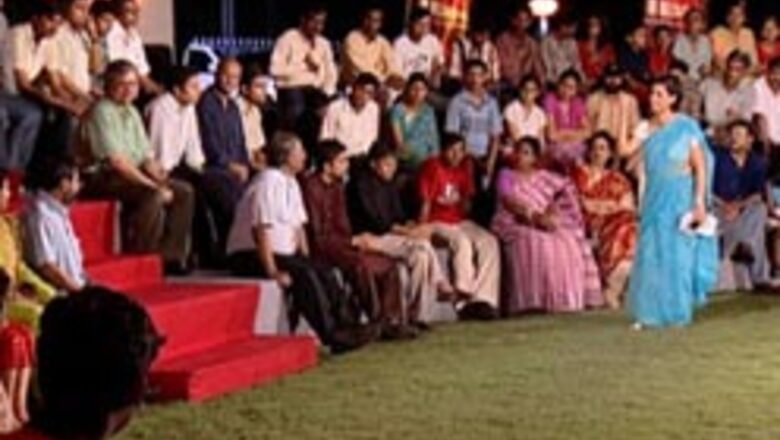
views
Kolkata: As the Left Front celebrates 30 years of uninterrupted rule in West Bengal, Bengalis across the world are looking back fondly at the beginning of the Marxist era in the state - a rule spanning three decades and marking arguably the biggest feat in Indian democracy.
To mark the occasion, CNN-IBN and Telegraph conducted a special poll to understand just what keeps the Left Front going so strong in the state.
The poll conducted by AC Nielsen covered 800 respondents in Kolkata and cut across various socio-economic groups.
To analyse the results and findings of the poll was an eminent panel including, Minister for Small Scale Industries in West Bengal Manabendra Mukherjee; leader of Trinamool Congress Sougato Rai; writer and musician Amit Chaudhri; Editor (Edit Page) Telegraph and historian Rudrangshu Mukherjee; President CII (Eastern Region) Bishwadeep Gupto; Financial Consultant with Trisis Financial Consultancies Shalini Patheria.
Is Left the right way to go?
The first question in the poll asked the respondents if they were satisfied with the Left rule in the state. While 59 per cent of respondents replied in affirmative, 41 per cent expressed dissatisfaction with the Left rule in the state.
The poll finding also threw up an interesting fact - the lack of anti-incumbency in the state is unprecedented in India’s democracy. “I don’t think this represents the view of Calcuttans as a whole. Even if you see in the General Elections as a whole the Left Front gets less than 50 per cent of votes,” Trinamool’s Sougato Rai’s argued.
While denying their party had an inherent weakness, Rai insisted Trinamool lagged because they couldn’t stand up to a “Stalinist party that uses violence to win elections.”
However, Manabendra Mukherjee of the Left completely refuted the argument.
“During the last 30 years if there is only one intelligent person in Kolkata, that’s Mr Rai. Primarily my reaction to the opinion poll is that 59 per cent people are satisfied,” Mukherjee said, carefully bypassing the question that there was dissatisfaction brewing against the Left in far flung areas like Purulia and Midnapore. He also added that situation will reverse itself should Trinamool come to power.
The second question asked respondents to list the Left government’s biggest success in the state. Most respondents said political stability was the red brigade’s most enduring quality but felt lack of job opportunities was their biggest failure.
Manabendra agreed with the findings of the above two questions and admitted that lack of job opportunities was the biggest roadblock in Left’s success.
“Industrialisation is the demand of people and not originated by the brain of Left. We are committed to create more jobs in the state,” he said.
Writer and musician Amit Chaudhri opened his reaction to the findings of the poll on a balanced note. “There are some resounding failures and some remarkable successes. It’s a mix of both. The exodus of the middle class and of the skilled labour from the state is one of the biggest setbacks. We know of the achievements like land redistribution of the 70s but one has to also look at multiculturalism of Kolkata and the changing demography of the city. It’s not just about Bengalis being powerful but also about non-Bengalis holding great economic power in the city. This co-existence is unique in world,” he noted.
Good job done, but no job given
Journalist Rudrangshu Mukherjee - who has been a constant critic of the Left - responded carefully to Chaudhri’s observations and underlined a big irony in the critique of the Left.
“Major critique of Left Front and the Left Front, too, accepts that lack of creation of job opportunities is a considerable failure and your poll indicates just that. Yet, the main opposition the Left opposes any attempt that the Left Front makes to create industries,” he said.
PAGE_BREAK
He also pointed out that the principle failure of the red brigade lay in systematic killing of the state’s education system, which was responsible for large-scale migration from West Bengal, specifically from Kolkata. “Once Bengal’s pride, every educational institution is in shambles today,” he rued.
However, Manabendra said Raudragnshu’s observations gave an elitist angle to the debate, something he did not agree with. “The education system is not determined by the quality of the top. You have too also look the base of the society. Rural schools are producing the best boys and girls,” he said.
The Left leader also urged the “elitist Calcuttans” to understand that the first generation among that class was coming up while the sanctity of good institutions remained. “Presidency College is still the best college in Calcutta and everyone believes in this,” he said.
The “job face” among the panelists - Biswadip Gupta of CII put forth his opinion on lack of jobs being Left’s biggest failure. “I think this was the case till sometime ago. 1992 was the watershed year for the Left government,” he said.
Just why is ‘IT’ not happening?
Gupta also hinted that while there was an IT boom in other capital cities (Chennai, as Sagarika pointed out), it wasn’t so much of a boom in Kolkata as industries weren’t being allowed to set up shop there.
“I speak from experience as I brought in an investment from outside India in Kolkata and it’s broken all myths and perceptions about it being a city where high-tech couldn’t be brought in.” Ironically, while the manufacturing sector lost out, it was the services sector that witnessed a temporary boom.
Executive Shalini Patheria pointed out that IT services contributed 51 per cent to the state’s GDP. However, she also said that there wasn’t enough infrastructure in the state to support the industrialisation that West Bengal is potentially capable of. “We still face a lot of red-tapism, duties are high and there are inflexibilities in land-use patterns,” she said.
Patheria however agreed Left Front had contributed immensely to the state’s per capita income and rate of economic growth.
“We are the third largest economy in the country and the very fact that it’s being seen as a destination of choice by a number of industries, goes on to show that. Tatas have comes in, Birlas are coming and DLF is planning to do a Gurgaon in Dankuni shows there’s hope around,” she said.
But does the 59 per cent believe in Left Front simply because there’s no one else to believe in? Rudrangshu Mukherjee agreed and said people could not believe Left Front’s leader.
Time for alarm, SEZ Kolkata
The next set of questions on the poll asked the respondents if they thought incidents like Nandigram and Singur - the most flammable issues in the state - were mishandled by the government.
In a stinging indictment, 72 per cent of respondents felt the Left had made a mess of the issue, while a measly 28 per cent gave the state government the benefit of doubt.
The respondents were also asked if they supported greater industrialisation in the state. While 52 per cent said they did not - perhaps indicating the impact of the violent fallout of Singur and Nandigram - 48 per cent said they were in favour of industrialisation.
Manabendra Mukherjee disagreed to the popular perception that Singur was Left Front’s “Waterloo.”
“I won’t say this is a mess up, but it’s just unfortunate. What’s happening in Bengal’s economy is a qualitative transition from agriculture-based economy to industry-based economy. Any such transformation brings turmoil,” he argued.
PAGE_BREAK
However, Sougato Rai was less forgiving and said while Nandigram was “genocide”, Singur was a “sellout to the Tatas.” But the criticism here doesn’t limit to Left Parties. Even Trinamool is under fire for behaving irresponsibly with party chief Mamata Banerjee walking out of the all-party meeting meant to arrive at a solution. However, Rai refuted the allegations and blamed CPI-M of playing party politics to remain in power.
Amit Chaudhri, when asked to react to the issue, agreed Left had dealt with the issue in a terrible fashion. “Left made a hash of their work. But I don’t think they have much of a choice. The state is pretty bankrupt and any party that comes to power may not have had any other choice. It’s just a question of how they have handled and that’s a disaster,” he said.
However, Biswadeep Gupta disagreed and said Singur and Nandigram did not represent industrialisation in the state and that the process will continue because even after these two incidents, five major steel plants have been announced.
Rai countered Gupta’s argument and said Trinamool wasn’t against industrialisation but wasn’t approving of industries being set up on fertile agricultural land.
The age-wise break-up to the above question revealed that 48 per cent of respondents in the age group of 31 to 45 years did not favour industrialisation at all and the younger generation in fact supported Left strategy.
So has the older generation shot itself in the foot? “That’s the interesting part. You will find in the poll that young people are in favour of industrialisation, so somewhere the opposition to the Left Front is losing out on the future which is a very important observation,” Rudgragnshu Mukherjee pointed out.
But he did agree that a transition from agri-base economy to an industrial economy was bound to produce aggression.
Farmer Left out?
There’s also an argument that Left has violently lived by cadre in villages and now the same thing has come to haunt them in form of Singur and Nandigram. Shalini Patheria said the problem in the two places was more about communication than anything else. “If the government had spoken to the villagers, things wouldn’t have been as bad.”
But Manabendra disagreed and said Left had always talked with the farmer. “We’ll get wonderful result even if we hold an election in Nandigram or Singur,” he said.
Another popular opinion that came from among the audience was that there was no organised force in the state. “What you see right now is simply bickering. The Trinamool looking at Panchayat elections. People born in Bengal have no memory of the past. Those are the people who support industrialisation. So, that could be a big jolt to the Left and they got to be careful,” an audience member said.
The final set of questions in the poll asked the respondents to rate the chief ministers the state has seen in the past 30 years. This question threw up no surprise results as Left veteran Jyoti Basu emerged the clear frontrunner with 54 per cent people voting in his favour. Present CM Buddhadeb Bhattacharjee received a close 46 per cent votes. However, an overwhelming majority - 72 per cent - respondents felt Mamata Banerjee made for a solid Opposition while only 28 per cent disagreed.
“The two CMs came to power in very difficult circumstances. Buddhadeb has a very tough task ahead of him. Youngsters can see that Buddhadeb has a tough task and is not being able to handle it,” said an audience member.
PAGE_BREAK
Another member said the test for Buddhadeb had just begun and it would be justified to give him time to prove himself. “I don’t think Buddhadeb has a good team with him,” he said.
Shalini Patheria said she agreed with Wipro’s Azim Premji’s observation that Buddhadeb was the country’s best chief minister.
However, Rudrangshu Mukherjee disagreed saying Buddhadeb was not a people’s CM. “But you cannot change the ideology of party as old as the CPI-M.”
Basu or Buddha: The better one?
Manabendra Mukherjee chose to put two and two together and said 54 per cent (of those who were satisfied with CPI-M) + 46 per cent (who supported Buddhadeb) made for 100 per cent support for the Left Front. However, he refused to comment when the anomaly in his analogy was point out.
Gupta said he had been traveling with Buddhadeb for three years and found him to be very efficient. “Everywhere he went he said we have made terrible mistakes. That reflects on his humility,” he said.
But Rai took the cue and said Buddhadeb was known as an apologising CM. “He errs and he apologises.” Rai said.
But the younger members of the audience felt it was in fact a reflection on how good a chief minister was. “Whenever someone tries to do something new, why is it that someone or the other poses an obstacle?” asked one audience member.
Rai also pointed out the difference between Jyoti Basu and Buddhadeb. “While Jyoti Basu did nothing and got criticsed for it, Buddhadeb did things and made a mess of it,” he said.
But when a finger was pointed at Trinamool leader Mamata Banerjee, Rai blew his top. “Mamata has been winning from sophisticated constituencies of Calcutta South for six successive Lok Sabha elections,” he said.
However, when the audience was asked if they would vote for Mamata, not one person raised their hand.
The last segment of the poll asked the respondents if they felt their state had been left behind by the rest of the country. While 68 per cent said yes, 32 per cent disagreed. An overwhelming 57 per cent audience also felt that the average Bengali had become more mediocre in the last 30 years of Left rule.
The big picture
Amit Chaudhri said he had a different spin on the mediocre argument. “In a certain sense, Bengalis have become narrow minded in the 30 years of Left rule. I have memories about Left Front rule in the city and although it was a traumatic period, it was more culturally refined than what it is now. At the same time one should not fall prey to nostalgia for some ideal Bengaliness which is now being foisted by the Bengali diaspora,” he said.
Most panelists - except Manabendra - felt excellence in Bengal was considered “elitist” and that it was a matter of concern. Manabendra said if there’s a consensus at the base level, “the peak would rise.”
The bigger picture that emerged was that while Bengalis within the state weren’t achieving much, the same people when go outside of the state made the country proud.



















Comments
0 comment